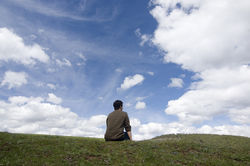Doing Nothing by Kaspa Thompson
Mid-summer. The days are imperceptibly shortening. The red-flame petals of the monbretia have unfurled and in our garden pond the tadpoles are being eaten by a newt. Goldfinches have started visiting our birdfeeder and after days of sunshine there is a night of rain and the garden is watered much more effectively than I could do with a hose or watering can.
So much of the natural world unfolds without us having to do very much at all: the sun comes up each morning, and sinks over the horizon at night; the moon waxes and wanes; the grass keeps growing, leaves and petals unfurl, fruits form and eventually fall to the ground where they are eaten.
Every now and again we need to do a little here and there to keep things ticking over: deadheading a rose, putting some more compost on the veg patch, pulling up a few weeds here and there.
We breathe without noticing most of the time, our heart beats without us thinking about it, our guts go on doing their thing.
At the same time our default reactions to the world and other people are often born of self-protectiveness. Human nature is mixed. We shy away from some things, are drawn towards others, and see what we would like to see instead of what’s there.
Doing nothing is often a wise choice. How much do we really need to add to what is already happening?
Being still allows us to get close to what is happening. Being still allows us to tune into how things are already unfolding. Acting from stillness and from being close to what is happening allows us to act wisely, if we need to act at all.
Sometimes just being still is already helping.
One summer day I was out walking with a few friends and their families. One of the children with us was tired and grumpy and started acting out. Various adults got involved. Cajoling, telling off, promising rewards for good behaviour and so on. I could feel myself pulled in two different directions. Part of me wanted to just walk away, and part of me wanted to get involved myself. And then I remembered that being still and doing nothing can already be helping. I relaxed into the moment. My mind quietened, those two parts of me stopped trying to get me to act and I caught the eye of a friend and smiled. They relaxed a little too. The situation around us settled down and the child cheered up.
On other days we’d have all gone around that cycle of trying to fix things and probably made things worse.
Introducing some stillness can be transformative.
How to practise doing nothing
- Make regular time to be still: sit in the garden or in a chair by the window and watch the world go by
- Take real breaks: instead of checking your phone (or your usual go to distraction) do nothing at all for a moment or two
- Turn off the TV and radio: give yourself a break from input
- Go for a walk
- Listen to the birds
- Choose to be on your own sometimes
- Practise doing nothing on a busy day: take a moment to be still before reacting, or choosing what to do next
Introduce some stillness into your life and see what changes.
Kaspa Thompson is a psychotherapist, mindfulness teacher and Buddhist priest. For info on therapy and mindfulness classes see: www.kaspathompson.co.uk and for his local Buddhist group see:
www.amidamandala.com


